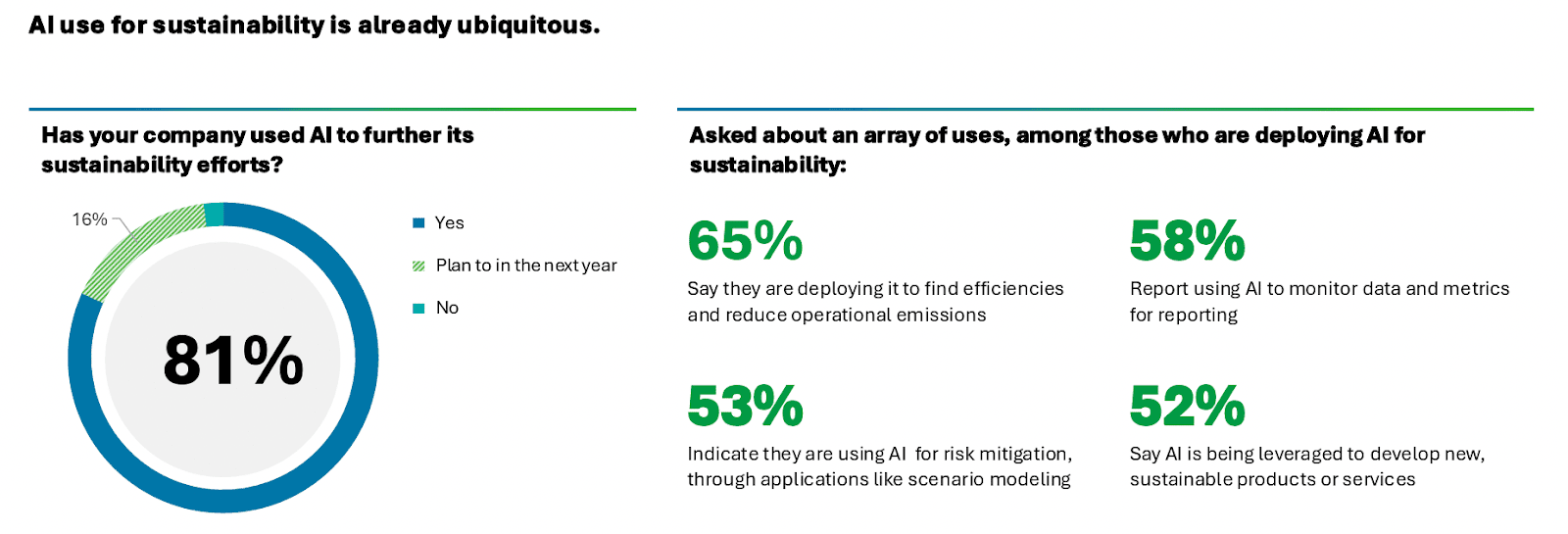Keeping up with ESG - Autumn Edition 2025
.webp)
Hello reader 👋
Read time: 8-10 minutes
Today we cover:
- COP30: slowing climate momentum and critical minerals focus
- Rejection of Omnibus and even less certainty for businesses
- Market around green metals; green premiums insights from top leaders
- New EMRT and tools reshaping supplier due diligence
- AI emerges as the defining lever for sustainability teams
KEY UPDATES
Slow climate progress and a growing focus on mining at COP30
As COP30 gets ready to take place in Belém, Brazil, next week, the summit faces criticism for slow political progress and big promises with little action. Brazil, which is hosting the event to show its climate leadership, is under pressure. Only about a third of countries have updated their national climate targets (NDCs), and new Brazilian laws that weaken environmental protections have worried activists. Globally, momentum is low: COP30 will have fewer world leaders attending than past summits, and no U.S. officials are expected, raising doubts about political commitment.
Even so, this summit is notable for bringing mining and critical minerals to the center of climate discussions. Brazil and Colombia are calling for a global treaty on the responsible mining of minerals like lithium and nickel, which are essential for clean energy technologies. Brazil’s mining sector has also pledged to cut its carbon emissions by up to 90% by 2050. This focus on mining adds new urgency to the talks, showing how the industry connects to climate goals, supply chains, and Brazil’s economic future.
Our friends at Vale Base Metals, together with the Columbia Center on Sustainable Investment, are inviting innovators to a COP30 workshop on Nature-Based Solutions for Climate-Smart Mining on November 15. The session will bring together start-ups, researchers, NGOs, and investors driving circular and nature-based approaches. Apply here.
2025: the year of mixed feelings
The IMO postponed its net-zero framework for shipping after a Saudi-led motion backed by the US passed, stalling what would have been the first global carbon pricing mechanism for any major industry. California has delayed its climate reporting rule-making until next year, citing a flood of public comments, although statutory deadlines remain unchanged and enforcement will be lenient during the initial cycles. US banking regulators withdrew their climate risk principles, stating that existing safety standards already cover material risks, leaving it to banks to decide whether climate fits into their models. And yet, most companies increased sustainability investments this year.
It is impossible to understand 2025, so I stopped trying.
KEY REPORTS
Strong demand, softer premiums in the green metals
McKinsey’s Global Materials Perspective 2025 report projects ~4.5% annual growth in energy-transition materials through 2035, but notes that supply won’t keep up unless the industry boosts productivity and finds substitutes, since current market prices remain too low to justify the new investments needed to close supply gaps. They also highlight a drop in willingness to pay for “green premiums,” especially in steel and copper. However, a closer look at the chart suggests a moderate softening rather than a significant decrease or collapse. My read: demand for green materials is still there, just more focused and pragmatic. Byers are prioritizing cost efficiency and strategic use of green inputs.
If you’d like to hear the take on the green premium from industry experts Hugo Brodie (London Metal Exchange) and Felix Schmitz (Kloeckner Metals Germany), watch our recent webinar here.

OECD report on traceability in critical minerals: a tool, not a goal
Following its February 2025 report on The Role of Traceability in Critical Mineral Supply Chains, the OECD Centre for Responsible Business Conduct and the IEA Critical Minerals Team are now surveying to gather industry insights on how traceability is being deployed in practice. The survey seeks input on prevalence, barriers companies face, and the goals they aim to achieve through traceability. Results will provide data on the topic that is otherwise unavailable elsewhere. The survey deadline is extended to 10 November 2025. Access the survey here.
The Role of Traceability in Critical Mineral Supply Chains report reinforces what many in the field already know from experience: traceability is only valuable when it serves a clear purpose. Having a long (and sometimes painful) history with these tools myself, I can say for certain that before investing in another platform or standard, it’s essential to ask why you need traceability, what exactly you want to trace, and how much that data is worth to you. Too often, traceability has been pursued for its own sake as a fancy thing to have. The report warns that poorly designed systems can add cost, duplicate efforts, or exclude smaller producers. The real challenge ahead is building coordinated, interoperable approaches that balance transparency, inclusiveness, and efficiency across global supply chains.
81% of sustainability executives now use AI
Deloitte’s 2025 Global C-Suite Sustainability Report shows that, and another 16% plan to do so within a year. Another finding that might have sounded like news in 2023: sustainability sits firmly among the top three business priorities, alongside technology adoption and AI itself. As we also highlighted in our Sustainability Outlook 2025, the focus is shifting from broad commitments to focused results: 65% use AI to boost efficiency, 53% for risk modelling, and 52% to design new sustainable products. With 83% of companies increasing sustainability investment, it becomes clear that the next phase of corporate sustainability will be built on data, intelligence, and automation, and those not already embedding AI will soon (already?) find themselves behind.


REGULATORY UPDATES
Omnibus rejected. The EU is perfecting uncertainty
The Omnibus I Package, focused on simplifying the Corporate Sustainability Reporting Directive (CSRD) and Corporate Sustainability Due Diligence Directive (CSDDD) in the EU, was rejected by the European Parliament on 22 October 2025. In practicality, that means negotiations have been delayed and the scope, thresholds and liability provisions remain uncertain.
The EU is now divided into three camps: the Council pushing for simpler, lighter rules with higher thresholds; the centre-right in Parliament wanting to go even further with deregulation; and the left-green bloc trying to protect the original ambition of the Green Deal. With no majority for a common line, three outcomes are possible: (1) a compromise in 2026 that slightly weakens CSRD and CSDDD but restores clarity; (2) a stalemate that keeps uncertainty for another year; or (3) a split outcome, where only the technical delays move forward while simplification stays stuck.
In every case, businesses face a regulatory environment defined less by policy direction and more by institutional paralysis, where planning of sustainability initiatives depends on guessing which coalition holds longer. The level of frustration with the EU politicians is perfectly described by my recent viral meme.
CBAM in force: 182k importers exempt, EU pays to ease the pain abroad
The CBAM Omnibus Initiative is now official. The 50-tonne exemption removes compliance obligations for about 182,000 importers, mostly SMEs and individuals, while still covering over 99% of emissions from covered goods. For companies still in scope, the updates simplify reporting, authorisation, and emissions calculations. From 2027, the Commission may set default carbon prices for countries with domestic carbon pricing systems, which could reduce the compliance burden further. Secondary acts defining benchmarks and verification rules are still pending.
Meanwhile, Brussels is trying to soften the diplomatic blow. The Commission plans to use part of its proposed €200B "Global Europe" fund (2028–2034) to help developing countries decarbonise industries hit by CBAM. Trading partners like Brazil, India, and South Africa have been vocal about the mechanism unfairly penalising their economies. The EU won't back down on the policy itself, but it's offering financial and technical support to help partners cut emissions and adapt.
MINERAL DUE DILIGENCE UPDATES
New version of ERMT
The Responsible Minerals Initiative recently released EMRT v. 2.1, bringing a few updates to the template used for cobalt and mica supply chain due diligence. The changes include a notice on which minerals are in scope, updates to the product list fields, and refreshed smelter and mine reference lists. RMI recommends using the updated version for current reporting, with the next release expected in Spring 2026.
The EMRT v2.1 update adds new scope notes and revised reference lists, raising the bar for data accuracy. We just released a new reporting module that drafts CMRT, AMRT, and EMRT responses with high precision, using the beSirius AI approach tailored to mineral supply chain data. It reduces manual work by 70% and improves consistency across disclosures. If you’d like to see how this module can help you already today, talk to us.
button "Request a demo" - https://www.besirius.io/request-demo - #5F5DDF
[be]SIRIUS NEWS
Executive Sustainability Dialogues: beSirius webinars
We’ve recently hosted two webinars, as part of a series of Executive Sustainability Dialogues, exploring how sustainability is becoming a real business driver across the metals and mining industries. If you haven’t watched them yet, it’s filled with uncensored insights from the key experts:
- Sustainability Outlook 2025: AI, Money, and the End of Sustainability as we knew it - featuring leaders from the UN Global Compact and ArcelorMittal, discussing how top teams are keeping sustainability strategic under budget cuts and shifting regulations, and how AI gives them the edge.
- Making Sustainability Commercial: The Metals Industry Perspective - with executives from the London Metal Exchange and Kloeckner Metals Germany, examining green premiums and how verified sustainability performance drives commercial outcomes.
- Next up in December - Rethinking Transparency: Building Competitive Advantage. What does it mean to build for transparency from day one? Join us to explore how miners can structure data, systems, and teams to reduce risk, boost trust, and move faster, without focusing on compliance checklists.
If you are interested in joining as our next guest, reach out to us.
Where to meet us next
Here are the events we will be speaking at and attending in the coming weeks.
🇺🇸 Responsible Business 2025
Maryland, US — 11–14 November
The Responsible Business Alliance Annual Conference is a cornerstone event for advancing responsible sourcing worldwide. It brings together industry experts and thought leaders to address global supply chain challenges, environmental sustainability, labour and human rights, and regulatory compliance.
🇨🇦 The Ontario Critical Minerals Forum
Toronto, Canada — 18–19 November
It is a major annual gathering bringing together mining, energy, investment and government leaders to advance projects in the energy transition and critical minerals space.
🇳🇱 Stainless Steel World Expo
Maastricht, The Netherlands — 18–20 November
Our Chief Impact Officer, Galina Donnik, will be speaking about the practical applications of AI in sustainability disclosure processes. Register here.
🇬🇧 London Mining Week (Resourcing Tomorrow 2025)
London, UK — 30 November – 5 December
It gathers global leaders across mining, investment, government, and technology to address the sector’s most pressing challenges. The event focuses on critical minerals, geopolitics, ESG leadership, and innovation driving the future of responsible resource supply.
